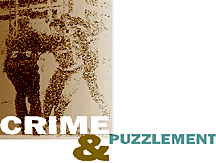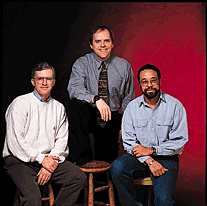

Aggressive police tactics have been getting publicity--and much credit--for the drop, but the UW criminologists question if these tactics really work.
 One of the most vocal
advocates of stronger police tactics is former New York Police
Commissioner William Bratton. His aggressive policy included arresting petty
criminals, such as subway turnstile jumpers, people who drink or urinate in the
streets, and graffiti artists. These lawbreakers, he says, often commit more
serious crimes and threaten neighborhood stability.
One of the most vocal
advocates of stronger police tactics is former New York Police
Commissioner William Bratton. His aggressive policy included arresting petty
criminals, such as subway turnstile jumpers, people who drink or urinate in the
streets, and graffiti artists. These lawbreakers, he says, often commit more
serious crimes and threaten neighborhood stability.
Bratton also charted New York police precincts like a battlefield map, sending in the "troops" to high-crime neighborhoods. Police were taken away from "reactive," random patrol work and told to make more narcotics and gun arrests.
Carnegie Mellon University Professor Alfred Blumstein, once a doubter, now agrees with Bratton. He recently told the New York Times that while the causes of the crime decline were complex and hard to isolate, part of the credit should go to the Brady law controlling handgun sales, more police officers on the streets and "the revised, more aggressive tactics" used by police.
"Police make a difference," Bratton told a convention of criminologists held a year ago in Boston. "We do take offense at some of your colleagues saying otherwise."

Weis is even more blunt. "Most successful criminals are not sleeping in the street and pissing in the gutters. The people they are arresting are the homeless, the Skid Road population. It's a tenuous connection in my opinion."
Crutchfield, while more diplomatic, says he has a "healthy skepticism" about aggressive policing. "I'm not saying that they're wrong, that it's not working. I'm saying we should take a serious look to see if it is really the cause of what is going on."
Along with the police, politicians are taking credit for the crime recession. In January, President Clinton said, "We set out to change this country's approach to crime by putting more officers on our streets through community policing and taking guns out of the hands of criminals. We are making a difference."
But all three UW professors dismiss the President's pronouncements. Claiming that sending 100,000 more police officers on the streets has stemmed the tide of crime "is just naive," says Bridges. As for the Brady law and assault weapon ban, "gun controls just don't have a big impact on the rates of violence," he adds. "States with and those without severe gun control don't have a big difference (in violent crime rates)."
A Numbers Game--Demographics Key to Crime
Drop
Tougher Penalties--Even Death
Sentences--Don't Make a Difference, Say Profs
It's the Economy, Stupid--Isn't it?
Send a letter to the editor at columns@u.washington.edu.